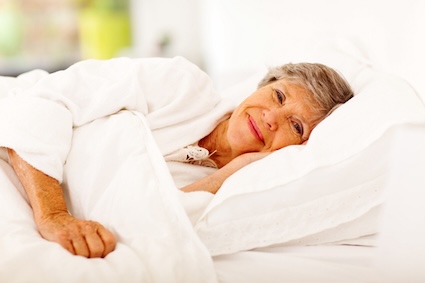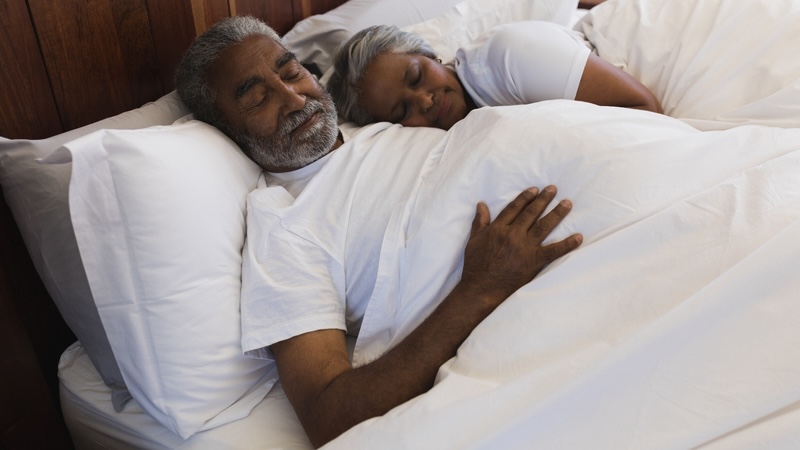The connections between sleep and aging are real, as slumber patterns change. Seniors Guide writer Terri Jones looks at reasons for the changes and offers tips for achieving sleep goals, a key to supporting health.
Throughout life, your sleep patterns changed. You would have needed 16 to 20 hours a day as a newborn, 11 to 12 hours as a toddler, nine to 10 hours as a teen, then seven to eight hours once you settled into adulthood.
Once you enter your senior years, changes can make a good night’s sleep feel like a thing of the past.
How are sleep and aging related?
After midlife, many people begin getting increasingly fewer hours of sleep, with a decrease of 30 minutes every decade. While this contributes to the belief that older people need less sleep, the National Sleep Foundation still recommends that those 65 and older get seven to eight hours.
However, your body also develops a different window of sleep. You may find yourself nodding off in front of the TV in the evening. And when your eyes pop open at 3 or 4 in the morning, it makes your previous 7 a.m. wakeup time feel like sleeping in!
Plus, as you get older, you spend less time in deep, restorative sleep, which can cause you to wake up more frequently throughout the night. On average, seniors wake up three to four times per night, and they may have difficulty returning to dreamland.
What causes these changes?
We chalk up so many physical changes to age alone, but it’s important to go deeper.
One of the reasons your sleep changes as you get older is the change in circadian rhythm, causing you to get sleepy earlier in the evening and wake up earlier in the morning.
Another culprit of poor sleep quality is a natural decline in the production of melatonin, the hormone that regulates your sleep, says Eric Zhou with the Division of Sleep Medicine at Harvard Medical School. Other hormones, such as testosterone and cortisol, also fluctuate with age and can negatively impact your slumber.
Medical conditions, including sleep apnea, restless leg syndrome, periodic limb movement, arthritis, and anxiety, can also play a role in your getting the zzz’s you need.
Additionally, Brienne Miner, MD, MHS, a Yale Medicine geriatric and sleep medicine specialist, notes that certain medications can make you drowsy during the day but keep you awake at night. And if the medical conditions or medications themselves don’t directly impact your sleep, they might cause you to need to pee during the night, which will, of course, interrupt your slumber.
And don’t discount lifestyle factors. Insufficient physical activity during the day, too much alcohol or caffeinated beverages, or a large meal within a couple hours of bedtime can negatively affect your sleep as well. You may also find that you’re more vulnerable to time changes, jet lag and other adjustments in your sleep schedule than in your younger years and have more difficulty getting back on track.
Tips for getting a good night’s sleep
 Despite the connection between aging and sleep problems, you can make adjustments that will improve your slumber.
Despite the connection between aging and sleep problems, you can make adjustments that will improve your slumber.
- Listen to your body clock. Go to bed when you’re sleepy and get up when you feel rested. When some seniors start waking up early in the morning, they don’t adjust their bedtime to compensate for this early awakening and, as a result, become sleep deprived. However, if you go to bed at 8 p.m., when your body tells you to, you’ve achieved your full eight hours when you wake up before the roosters at 4 a.m. (that doesn’t mean you have to get out of bed right away; just don’t linger too long).
- Maintain a consistent sleep schedule, going to bed and waking up at approximately the same time each night.
- Establish a sleep-conducive setting. “You want to create a relaxing environment – quiet, cool and dark,” Jing Wang, MD, associate professor of medicine at the Icahn School of Medicine at Mount Sinai, told AARP. Turn off music, lower the thermostat slightly and close the blinds – maybe even get room-darkening curtains. Another tip offered by Wang is to remove the clock from the bedroom – or at least cover it up – so you don’t agonize over when you’re waking up and how long you’re lying awake.
- Turn off technology. At least an hour before you bed down (ideally two to three hours), turn off TVs, phones, tablets, and e-readers. The blue light that’s emitted from these devices impedes sleepiness by fooling your body that it’s still daytime, thus slowing the production of melatonin. If you’re compelled to use electronics close to bedtime (or in the middle of the night if you wake up), blue-light-blocking glasses might help.
- Get moving. Be sure to get plenty of physical exercise during the day. Chris Winter, MD, a neurologist, sleep expert and author of “The Sleep Solution: Why Your Sleep Is Broken and How to Fix It,” told AARP, “Exercise is the one thing that truly improves sleep quality and quantity.”
- Enjoy a short siesta. If you haven’t managed to get your full seven or eight hours at night, don’t deprive yourself of a quick nap. Just be sure to make it a “power nap” (no more than 30 minutes) so it doesn’t disrupt your sleep at night.
If you’re still having trouble getting enough shuteye, seek help from your primary care doctor or a sleep specialist. Getting a good night’s sleep is critical for your health, including your cardiovascular and cognitive health. It’s also vitally important for your well-being and getting the most out of your life!
Related: Meditation Exercises and Sleep





